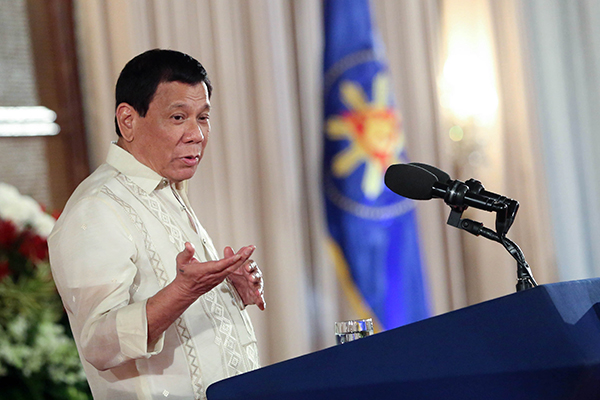Presidential Anti-Corruption Commission created

President Rodrigo Duterte has created a powerful Presidential Anti-Corruption Commission (PACC) in a bid to make good his threat to investigate Ombudsman Conchita Carpio-Morales and her deputies who might have abused their powers and committed corruption. Richard Madelo/Presidential Photo
MANILA, Philippines — President Duterte has created a powerful Presidential Anti-Corruption Commission (PACC) in a bid to make good his threat to investigate Ombudsman Conchita Carpio-Morales and her deputies who might have abused their powers and committed corruption.
Malacañang released yesterday Executive Order No. 43 that will look into excessive lifestyles, graft and corruption activities, and then recommend punishment against erring officials that would range from suspension to removal from office.
Previous presidents since Fidel Ramos created similar anti-graft bodies under their office.
Apart from the power to conduct probes, the PACC will have the authority to subpoena personalities and documents as well as enlist the help of security forces to enforce an order or subpoena.
Duterte earlier slammed Morales along with deputies Melchor Arthur Carandang and Rodolfo Elman for pursuing a fact-finding investigation on his alleged illegal bank deposits amounting to at least P200 million, as recently disclosed by Sen. Antonio Trillanes IV.
Two groups have filed separate complaints against Morales and the two officials of the ombudsman last Tuesday for cases ranging from graft, betrayal of public trust to non-declaration of assets and liabilities.
Under the EO, Duterte also authorized the commission to issue preventive suspension, not exceeding 90 days, when the investigation warrants the same as when the charges are punishable with removal from office.
After completing its probe, the commission shall submit its report and recommendations directly to the President for approval and final disposition.
During investigation, the commission is mandated against disclosing details related to an ongoing probe. All disclosures relating to administrative case shall be balance, fair and accurate.
The PACC may refer any case for appropriate action to the Office of the Ombudsman, or deputize any other office, committee, commission, bureau, agency, department or instrumentality, including government-owned or controlled corporations, for assistance.
Executive Secretary Salvador Medialdea explained the President can order the lifestyle checks and inquiries on all his appointees and submit to the proper disciplining authority such as Congress, for possible impeachment.
Signed by the President on Oct. 4, the order will take effect 15 days after its publication.
Under EO 43, the PACC is given powers to summon government personnel and records and to administer oaths pursuant to its authority to take testimony or receive evidence. It can also tap the support of any law enforcement agency of government to call upon all state agencies, including government-owned and controlled corporations.
“The commission may recommend the admission of vital witnesses into the Witness Protection Program administered by the Department of Justice,” the six-page order read.
The EO is aimed at conducting investigation on appointees and government officials who might violate existing laws such as Republic Act 3019, Republic Act 6713 and certain provisions of the Revised Penal Code.
“The President’s power to appoint carries with it the power to discipline and remove public officials and employees, except those who are not otherwise subject to his disciplining authority as may be provided by the Constitution and existing laws,” the EO said.
As head of the government, it added the President has the authority to conduct lifestyle checks and fact-finding inquiries on all public officials and employees, including those outside the executive department.
“There is a need to create a separate commission under the Office of the President solely dedicated to providing assistance to the President in the investigation and hearing of administrative cases and complaints,” the EO added.
Upon the instructions of the President, the commission may also investigate presidential appointees in the Armed Forces of the Philippines and the Philippine National Police whenever he deems it necessary or appropriate.
The commission may also conduct lifestyle checks and fact-finding inquiries on acts or omissions of all presidential appointees including those outside the executive branch of government which may be violative of the Constitution or contrary to law, rules, and regulations. This also concerns acts that may constitute serious misconduct tantamount to betrayal of public trust.
On the basis of such fact-finding inquiries, the commission shall submit its report and recommend courses of action to the President.
In all investigations, due process will be observed. The resignation or retirement of the public officers under investigation shall not divest the commission of jurisdiction to continue the investigation or hearing thereof.
The PACC will also be involved in the conduct of lifestyle checks and/or fact-finding inquiries concerning presidential appointees and other public officers allegedly involved in graft and corrupt practices.
- Latest
- Trending




























